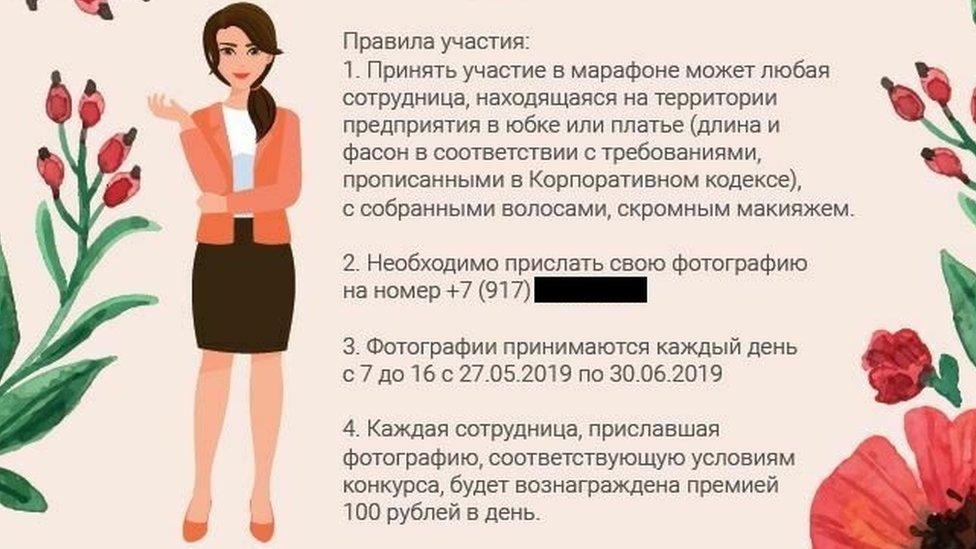Company criticised for paying female staff to wear skirts
- Published

Campaign material for the "femininity marathon" encouraged women to wear skirts and dresses
A Russian company has been heavily criticised for offering female employees cash bonuses to wear skirts or dresses to work.
Tatprof, an aluminium manufacturer, is running a "femininity marathon" campaign until 30 June.
Female staff who wear a dress or skirt "no longer than five centimetres from the knee" are paid 100 roubles ($1.50, £1.19) on top of their regular wages.
In order to receive the bonus, women must send the company a picture.
Many social media users have responded with incredulity to what some described as the "horrible treatment of women".
Prominent feminist blogger and journalist Zalina Marshenkulova called Tatprof's initiative "news from the Middle Ages" .
You might also be interested in:
The company, a supplier for the 2014 Winter Olympics in Sochi and the 2018 football World Cup, it rejected accusations of sexism and said 60 women had already taken part.
"We wanted to brighten up our work days," a spokesperson told the radio station Govorit Moskva.
"Our team is 70% male. These kinds of campaigns help us switch off, rest. This is a great way to unite the team.
"Many women automatically wear trousers to work, which is why we hope that our campaign will raise our ladies' awareness, allowing them to feel their femininity and charm when they make the choice of wearing a skirt or dress."
Users of Twitter in Russia were not impressed.
"The company does not see this as sexist and believes that 'the factory has transformed'," tweeted @shagaliev97.
"A 100-rouble bonus for women who will come in short skirts and in makeup to... brighten up the day of a male-dominated team," read another tweet. "Indeed, why do we need feminism when one can just please men for money?" they asked.
Dumplings and pull ups
The company has planned other so-called "femininity" events in June, including a competition to see who is the quickest at making dumplings.
Anastasia Kirillova, from the company's department of corporate culture and internal communications, said the idea for the campaign had come from CEO Sergei Rachkov.
"He is very concerned about this issue - mixing gender roles," .
"And he really wants to maintain the female essence in every female employee of the company, so that young women do not have male haircuts, do not change into trousers, so that they engage themselves in handicraft, project all their warmth into raising children."
The company is also holding competitions for its male employees. Last week it staged a pull-up contest.
- Published2 July 2018
- Published26 June 2018